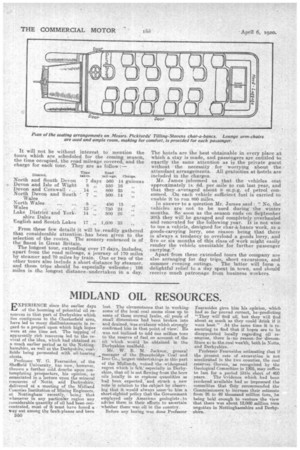MIDLAND OIL RESOURCES.
Page 22

If you've noticed an error in this article please click here to report it so we can fix it.
EXPERTENCE since the earlier days of the booming of potential oil resources in that part of Derbyshire which lies contiguous to the Chesterfield area, have led to many disillusionments in regard to a project upon which high hopes were at one time set. The tapping of apparently rich resources led to the revival of the idea, which had obtained at a much earlier period as to the Nottinghamshire, as well as the Derbyshire,"-coalfields being permeated with oil-bearing strata.
Professor W. G. Fearnsides, of the Sheffield University, has now, however, thrown a further cold .douche upon contemplating prospectors, his opinion, as enunciated in a lecture upon the mineral resources of Notts. and Derbyshire, delivered at a -meeting of the Midland Counties Institution of Mining Engineers, at Nottingham recently, being, that whenever in any particultr region any considerable quantity of oil had been concentrated, most of it must have found a way out among tbe fault-planes and been D50
lost. The circumstance that in working. some of the local coal seams close up to some of these normal faults, oil pools of small dimensions had been broken, into and drained, was evidence which strongly confirmed him in that point of view: He was not inclined to add one million tons to the reserve of fuel. on account of the oil which. would be obtained in the Derbyshire coalfield.
Mr. W. B. M. Jackson, general manager of the Sheenbridge Coal and Iron Co., largest undertakings in this part of the Midlands, voiced the widespread regret which is felt,' especially in Derbyshire, that oil is not flowing from the bore oils locally in as copious quantities as had been expected.' and struck a new note in relation to the subject by observing that it would always seem•to him a short-sighted policy that the Government employed only American geologists to advise them in their efforts to ascertain whether there was oil in the country.
Before any boring was done Professor
Fearnsides gave him his opinion, which had so far proved correct, he.predicting " They will find oil; but they will find about as much as they could drink if it were beer." At the same time it is reassuring to find that if hopes are to be disappointed locally regarding oil resources, there is "no reason for discomfiture as to the-coal wealth, both in Notts. and Derbyshire.
Professor Fearnsides estimating that if the present rate of excavktion is not accelerated in the two counties, the coal reserves therein, as recognized by the Geological Committee in 1905, may suffice to last for a period little short of .400 years. The levidence which had been rendered available had so impressed the committee that they recommended the Commissioners to increase their estimate from 26 to 49 thousand million tons, he being bold enough to venture the view that there was about 12,000 million tons . =gotten in Nottinghamshire and Derbyshire.




























